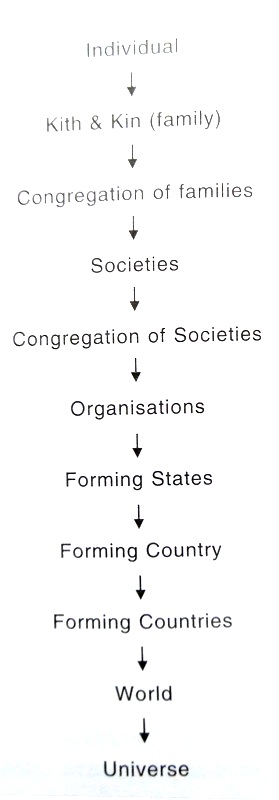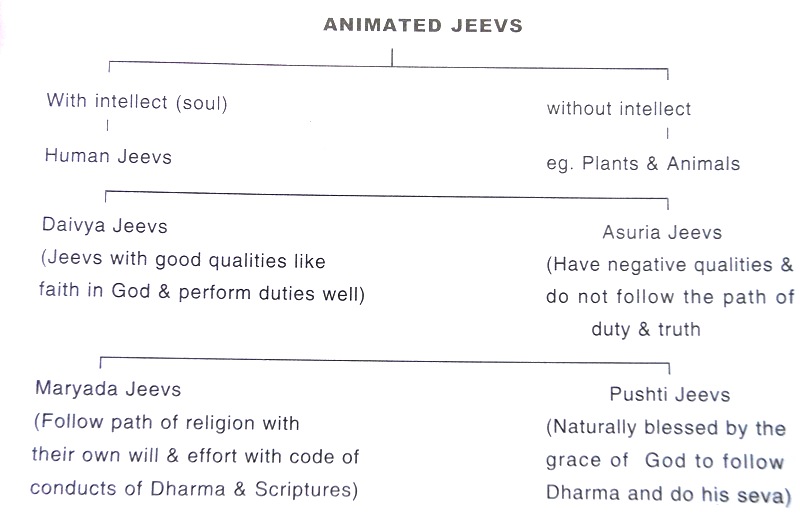Introduction
Pushtimarg is an Ocean, filled with the grace of Shreenathji. It has innumberable pearls of wisdom which help us to understand "Krishna" and his leelas. Pushtimarg is a beautiful rainbow and a spectacle for those who want to pursue it. Pushtimarg covers the span of around 525 years of history. It was started by "Shree Vallabhacharyaji" elaborated and propounded by Shree Gusainji and his sons. Even today Pushtimargiya traditions and beliefs are carried out by about 250 Vallabhkul Acharyas.
This Pushtimargiya kalpavraksha has grown and become the most respected and followed Vaishnav Sampraday.
Dharma
We by god's grace have been born as human beings, the highest evolved gods creation. Having been born as Humans, The only creation bestowed with the ultimate strength of intelligence & discrimination. We have to conduct ourselves with specific responsibilities.
Dharma is the foundation of life. Dharma means our path of 'righteousness'. Living ones life according to the code of conduct mentioned in our vedas and upanishads (Religious Texts). In simple terms, Dharma means "DUTY". The word Dharma is derived from the sanskrit word "DURU" - which means to bear or to hold on to a commitment, which has a permanent bearing in our life is called "DHARMA".
We as a human society have our duties towards family, friends, nature, country etc.,

DEHA DHARMA- This means our duty to ourselves in the form of good habits to maintain our body, soul and mind. We should study well, maintain good health and economically be independent as adults, to be self supportive and support our family and the needy.
DESH DHARMA- We as responsible citizens of our country should never fail to do our duties towards our country.
ATMA DHARMA- Soul has been separated from Parmatma(God). This relation can be reunited by Dharma. Search of the soul to unite with the Almighty is ATMA DHARMA. It helps us to reunite with the Almighty. Performing all these duties with conscious effort and commitment, constitute 'DHARMA'.
Dharma is universal, starting with an individual.

The other meaning of the word Dharma is 'Religion', which is specific to a Religion, i.e., different people in the world follow different religions.
Some of the other Dharmas are
1.CHRISTIANS - They follow "BIBLE" that preaches the same laws of 'DHARMA'
2. In ARABIC it is Islam - which means 'PEACE'
3. In Chinese it is called 'TAO'
4. Japanese call it 'ZEN'

The ultimate aim of each is to be one with 'GOD'.
We follow Hindu 'Dharma', once called 'Sanatan Dharma'. Sanatan, because the principles are eternal and never changing and are the oldest. It was universal Dharma. Our ancestors were "ARYANS" which means 'Great' and used to follow Dharma. Hindu dharma was started by God himself who gave us Vedas. Other religions were started by great Human souls sent by God.
God will be greatly pleased by us, if we lead our life according to Dharma.
VED
The word 'ved' is derived from the word "vid" ie., "to know". Ved is knowledge.
Veds are the manifestation of God's breadth and are considered as God's words. They are the world's ancient scriptures and were simplified by the great "Rishi Vyasji".
There are 4 vedas
1. The Rig Veda - This is the oldest
2. The Yajur Veda - They have the hymns in praise of Lord.
3. Sama Veda - This contains the mantras and the essentials of music & fine arts
4. Atharva Veda - Has mantras pertaining to health.
Upanishads
They are also God's creation and have the philosophy of God, Universe and Moksha. The work 'Upanishad' means to stay in touch with the great, ie., God and Guru. This helps us to study understand better the principles of Dharma. There are approximately 20 upanishads. To name a few, Katho Upanishad, Isavasys Upanishad, Keno Upanishad, Channdogya Upanishad, Mundaka Upanishad.
Puranas
Puranas and Ithihasas -
Purana means history, a collection of events that took place many years ago. For eg. Ramayan, Mahabharat, Bhagwatji, Shiv Puran, etc. It also has history of demigods and God's devotees.
THE PATHS OF HINDU DHARMA
Basically there are three paths or margs of Hindu Dharma.
1. GYAN MARG- This is the path of knowledge, meditation, reading and understanding the meaning of scriptures.
2. KARMA MARG- This is the path of duty and action. Physical actions performed by us for our own livelihood to support ourselves. Physical efforts - made by us for the Lord like doing poojas, Rituals, Yagnas and Vratas.
3. BHAKTI MARG- This is the path of Devotion, to love God whole heartedly only for his sake and for what he is. This is the path of love by the heart and of implicit surrender to the lord with total faith.
BHAKTI IS OF 2 TYPES
a. Maryada Bhakti - Here a person offers his devotion (Bhakti) to the demigods and godessess according to scriptures.
b. Pushti Bhakti - Here a person offers his divine selfless love by doing seva of the 'FOUNDATION HEAD', the lord Sri 'KRISHNA' alone.
JEEV
To perform Bhakti, the physical body is not enough. It has to have an 'animate soul'. This is the greatest gift of God to human beings. This individual with an 'animate soul' is called JEEV. That is why humans are greater than God's other animate creations (like animals, birds, trees etc. They all have life but the soul is missing). Jeev is a part and parcel of the Lord created by the Lord himself.
CREATION of JEEV
Thousands of years ago, parmatma created the Universe for his happiness and sport (Leela). The Universe was his play ground. And he created animated beings as his playmates. Just as sparks fly out from fire, similarly numerous beings spring forth from parmatma. Thus jeev is the smallest form of creation of Parmatma.

GURU
Guru is described as a spiritual teacher or a master who leads us from darkness to light. We, as individuals cannot proceed on the correct path of life without a guiding light. Guru has the power and wisdom to dissolve our spiritual ignorance. He inspires devotion and his presence purifies all. He is verily like a LINK between the individual seeker and the immortal.
To follow the path of Dharma there is a prescribed set of rules given by our scriptures made to understand by our guru who are our religious leaders.
Having a physical Guru is of great benefit to a seeker as it saves a lot of time and effor because he is a guiding light.
Guru plays a very important role in our life. He is our friend, philosopher and guide, who teaches us to lead a spiritual and a dutiful life. To the disciple Guru is God. Once a year we pay homage to personal Guru and this day is "Guru Poornima".
VAISHNAV
In simple words one who worships Lord Vishnu is called Vaishnav.
Vishnu(one who is in every atom of the creation)
Vish - to stay Anu - a smallest particle (atom)
Thus one who believes that God is in every atom of the world is "Vaishnav"

According to scriptures there are ten incarnations of Vishnu. Of these, four incarnations (avtars) are considered important in pushtimarg.
1. Vaman avtar
2. Narsingh avtar
3. Ram avtar
4. Krishna avtar
Krishna avtar of Vishnu is considered as the Purna - Purushottam. Parmatma Vishnu for ruling of the universe created three devtas. 1. Bhramha - the creator 2. Vishnu the maintainer 3. Shiva - the destroyer.
These devtas are created with specific duties assigned by parmatma Vishnu. Our Dharma is "Vaishnav Dharma".
We vaishnavs worship this form of Purna - Purshottam who was born to Vasudev and Devaki and was brought up by Nandbawa and Yashodaji as Balkrishna at Gokul, along with Gops and Gopies of Vraj bhoomi, who stayed in Gokul for a period of 11 years and 52 days and also one who appeared from Girirajji ie., Govardhannathji or Shreenathji.
We are instructed by our Pushti Guru, Shree Vallabh, to serve these swaroops of Balakrishna so we are called Pushtimargiya Vaishnav.
QUALITIES of A 'Real Vaishnav'
a. Should be humble
b. Should be charitable
c. Should not be proud
d. Should be just
e. Should adhere to the truth
f. Should love all
g. Should Believe in God